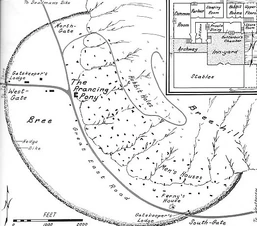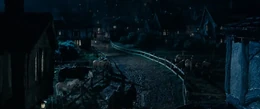
|
"Can you see anything?" "Nothing. There's nothing." The descriptive majority of this article's text is unsourced, and should be supported with references. |
Bree was a village, of Men and hobbits, in Middle-earth, located east of the Shire and south of Fornost in Eriador.
History
Bree was an ancient settlement of men in Eriador by the time of the Third Age of Middle-earth, but after the collapse of the Kingdom of Cardolan, which had claimed it, Bree continued to thrive without any central authority or government for many centuries. Bree had become the most westerly settlement of men in all of Middle-earth by the time of the War of the Ring, and became one of only three or four inhabited settlements in all of Eriador. At the time of The Lord of the Rings, Bree-land was the only part of Middle-earth where Men and Hobbits dwelt side by side in peace. Being located on the most important crossroads in the north, on the crossing of the Great East Road and the Greenway, people would pass through Bree. The Prancing Pony had many rooms, but the local people did not seem accustomed to many travellers.
Hobbits from the Shire would also occasionally visit Bree. The Rangers were also familiar to Bree-folk, though they are suspicious of them (and to them). Bree is the place where, seemingly by accident, Gandalf and Thorin first met. They were both thinking about the same problem: the dragon Smaug at the Lonely Mountain. The meeting led to the undertaking of the Quest of Erebor, which resulted in the death of Smaug and the finding of the One Ring by Bilbo Baggins.
During the War of the Ring, a day's ride east from the village along the road lay The Forsaken Inn, according to Aragorn, although nothing else is known of that place. Directly west of Bree were the Barrow-downs and the Old Forest. Bree was the chief village of Bree-land, a small wooded region near the intersection of the main north-south and east-west routes through Eriador.

A map of Bree-town from The Atlas of Middle-earth
It was not unheard of for Hobbits of the Shire to visit to Bree. This was especially true of the more adventurous Brandybucks, who lived just over a day's journey from the place. People there could recognize Shire-folk from their accent.
Despite raising some of their own "leaf," the Bree-folk very much enjoyed Shire Pipe-weed from the Southfarthing.
In The Fellowship of the Ring, Frodo Baggins met Strider (Aragorn) at the largest inn in Bree, The Prancing Pony, owned by Barliman Butterbur. Several of the Ringwraiths attempted to kill the hobbits, but Strider anticipated this, and the hobbits were in a front parlor with him when the Black Riders struck. Frodo and his companions later traveled through Bree on their way home and found things rather worse off there.
Etymology

Bree at nighttime, as seen in Peter Jackson's The Fellowship of the Ring
The name Bree means "hill" in Brythonic, a Celtic language, referring to the fact that the village of Bree and the surrounding Bree-lands were centered around a large hill. According to Tom Shippey, Tolkien was inspired by the actual town of Brill.
Appearances in the books and films
- The Fellowship of the Ring (novel)
- The Fellowship of the Ring (film)
- The Return of the King (film)
- The Hobbit: The Desolation of Smaug (film)
Portrayals in adaptations
The Hobbit film trilogy
In Peter Jackson's The Hobbit: The Desolation of Smaug, Bree is seen during a flashback, when Thorin Oakenshield and Gandalf discuss the dragon Smaug and Thorin's missing father, Thrain. In the Prancing Pony, Gandalf urges Thorin to take back Erebor, and tells Thorin they're going to need a burglar.
The Lord of the Rings film trilogy
In The Lord of the Rings: The Fellowship of the Ring, Frodo and his companions arrive at Bree almost immediately after the scene in which they leave the Shire, giving the impression (perhaps unintentionally) that the two are much closer together than described by Tolkien. From the Brandywine Bridge, it is roughly a three-day walk to Bree.
Video games

A map of Bree from The Lord of the Rings Online
- Bree is also depicted in video games such as The Lord of the Rings: The Fellowship of the Ring (video game), The Lord of the Rings: War in the North, and The Lord of the Rings Online, where it serves as one of the main hub for new players.
Translations around the world
| Foreign Language | Translated name |
| Bulgarian Cyrillic | Брее |
| Chinese (Hong Kong) | 布里村 |
| Czech | Hůrka |
| Dutch | Breeg |
| Estonian | Voore |
| Finnish | Brii |
| Gallician (Spain) | Prebe |
| Georgian | ბრი |
| Greek | Μπρι |
| Hungarian | Brí |
| Irish Gaelic | Brae |
| Italian | Brea |
| Japanese | ブリー |
| Korean | 브리 |
| Norwegian | Bri |
| Persian | بری |
| Polish | Bree |
| Portuguese (Brazil) | Bri |
| Portuguese (Portugal) | Bree |
| Russian | Пригорье (Prigor'ye) |
| Slovak | Svažiny |
| Thai | บรี |
| Ukrainian Cyrillic | Брі |
| This page uses content from Wikipedia. The original article was at Bree (Middle-earth). The list of authors can be seen in the page history. As with The One Wiki to Rule Them All, the text of Wikipedia is available under the Commons Attribution-Share Alike license. |
|
Places of Middle-earth and Arda
Middle-earth Locations:
Provinces/Regions: Arnor | Dunland | Ettenmoors | Forochel | Forodwaith | Gondor | Harad | Ithilien | Khand | Lindon | Minhiriath | Mordor | Rhovanion | Rhûn | Rivendell | Rohan | The Shire Forests & Mountains: Amon Dîn | Amon Hen | Amon Lhaw | Caradhras | Emyn Muil | Erebor | Fangorn Forest | High Pass | Iron Hills | Lórien | Mirkwood | Mount Doom | Mount Gundabad | Old Forest | Orod-na-Thôn | Tower Hills | Weathertop Hill City/Fortifications: Angband | Barad-dûr | Bree | Caras Galadhon | Dol Guldur | Fornost Erain | Hornburg | Isengard | Minas Morgul | Minas Tirith | Last Homely House | Tower of Amon Sûl | Tower of Orthanc | Osgiliath | Umbar | Utumno Miscellaneous: Argonath | Astulat | Buckland | Cair Andros | Dagorlad | Dead Marshes | Enedwaith | Fords of Isen | Gap of Rohan | Grey Havens The rest of Arda:
Aman | Burnt Land of the Sun | Dark Land | Empty Lands | Neldoreth | New lands | Númenor | Tol Eressëa |
